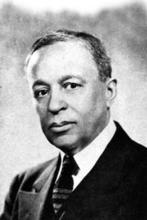Description
Henry McKee Minton was born on 25 December 1870 in Colombia, South Carolina. His father was a lawyer. Henry was an only child. He began to attend public schools in Washington, D.C. at the age of five. He spent two years in the Academy of Howard University, then studied at Phillips Exeter Academy in New Hampshire, graduating in 1891. He played a prominent role among the student body of Exeter. He was president of the debating society, co-editor of the Pean and class orator at his commencement. Minton then spent a year studying Law at the University of Pennsylvania, followed by three years studying Pharmacy at the Philadelphia College of Pharmacy. He graduated with a Ph.G. degree in 1895. In 1897 he opened a drugstore, the first in Philadelphia to be operated by an African American. Colonel McKee died in April 1902. According to newspaper reports, he was “the richest coloured man in America.” In his will, Colonel McKee left very little of his money to his family and other acquaintances, leaving most of his fortune to the Roman Catholic Church to build a college for orphans, despite having no prior connection to that church. After some dispute, Henry Minton obtained $25,000 from the estate, which proved much smaller than had been rumored. This was still a very large amount of money at the time. On 15 May 1904 Minton co-founded founded Sigma Pi Phi, also called the Boulé, the first Black Greek letter fraternity. At that time, fraternities were important in helping people develop contacts that would assist them in their careers. The Boulé was to grow into an exclusive and influential national organization. Minton gave the purpose as to “bind men of like qualities, tastes and attainments into close sacred union, that they might know the best of one another.” He said that new members should not be “selected on the basis of brains alone, but in addition to congeniality, culture, and good fellowship, they should have behind them [at initiation] a record of accomplishments, not merely be men of promise and good education.” In 1906 he became the first pharmacist for the Douglass Hospital, which had been founded in 1895 by Dr. Nathan F. Mossell and was the first hospital in Philadelphia for African Americans.

